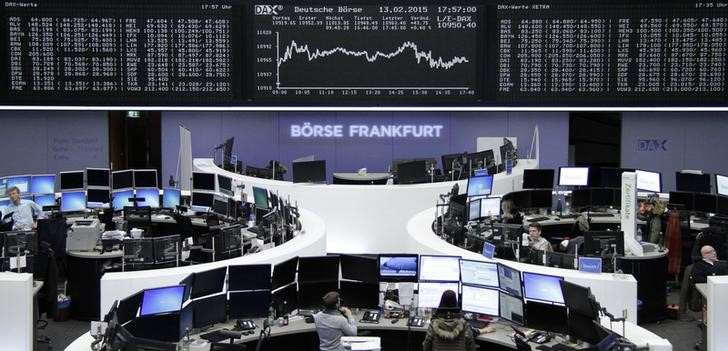By Nigel Stephenson
LONDON (Reuters) - Global shares hit their highest since September and the euro firmed on Monday with investors cautiously optimistic that euro zone finance ministers would reach a funding deal for debt-laden Greece.
The prospect of Greece and its partners reaching agreement on a debt deal helped push yields on low-risk government bonds higher, though both sides struck hardline postures as the talks began at 1400 GMT.
"There is an underlying view that there has to be a resolution, not least because Greece apparently has little or no bargaining power," said John Bilton, head of the global multi-asset strategy team at JPMorgan Asset Management.
The MSCI all-country world stocks index, which has risen in recent days on hopes for a Greek deal and a ceasefire in Ukraine, touched its highest since Sept. 22. It was last fractionally up on the day at 427.95 points.
Tokyo's Nikkei closed at its highest since July 2007, buoyed by a record close on Friday in the U.S. S&P 500 index and after data showed Japan emerged from recession in the final quarter of 2014, although its 0.6 percent growth was less than forecast.
U.S. financial markets were closed on Monday for the Presidents' Day holiday.
The euro rose 0.2 percent to $1.1407.
"This can quickly turn sour for the euro if there is no deal today," said Susanne Galler, a strategist with Jefferies in London.
"The market consensus is for them to do a deal by the end of this week. But we think that if there's no deal today and the clock starts ticking then the euro will look increasingly vulnerable."
The pan-European FTSEurofirst 300 stocks index fell 0.2 percent and Germany's DAX, which hit a record high on Friday, was down 0.4 percent.
Athens' volatile stocks index fell 3.8 percent, having risen 5.6 percent on Friday, but was still at levels hit before the Jan. 25 election. Greek three-year bond yields rose 183 basis points to 17.57 percent, way below last week's 21.8 percent peak.
Greek Prime Minister Alexis Tsipras, elected last month on a pledge to scrap austerity measures imposed under Greece's international bailouts, said on Sunday he expected difficult negotiations but was "full of confidence".
French Finance Minister Michel Sapin hinted at a slight easing of euro zone opposition to Greek requests for an end to austerity and a new debt deal, saying Europe must respect the political change in Athens. However, German Finance Minister Wolfgang Schaeuble said in a radio interview he was "very sceptical" there would be a deal.
Greece's current bailout expires on Feb. 28.
BENCHMARK BONDS
Cautious optimism over Greece helped push core euro zone government bond yields higher. Benchmark German 10-year yields rose 0.3 basis points to 0.346 percent.
The dollar was broadly weaker. It fell 0.1 percent against a basket of major currencies.
The yen rose 0.2 percent to 118.46 to the dollar and sterling hit a six-week peak of $1.5441 after a Bank of England policymaker said interest rates would need to rise sooner than investors expect. It later retreated to $1.5382, down 0.2 percent on the day.
Oil held on to last week's gains after Kuwait's oil minister said lower levels of supply would support prices in the second half of this year. Brent crude was last up 0.1 percent at $61.60 a barrel, off a high for the day of $62.57. Oil topped $60 a barrel last week for the first time since December as the number of oil rigs in the United States fell.

Dollar weakness and nerves about the Greek talks drove gold higher. Spot gold last traded at $1,230.60 an ounce, off a high of $1,236.50.